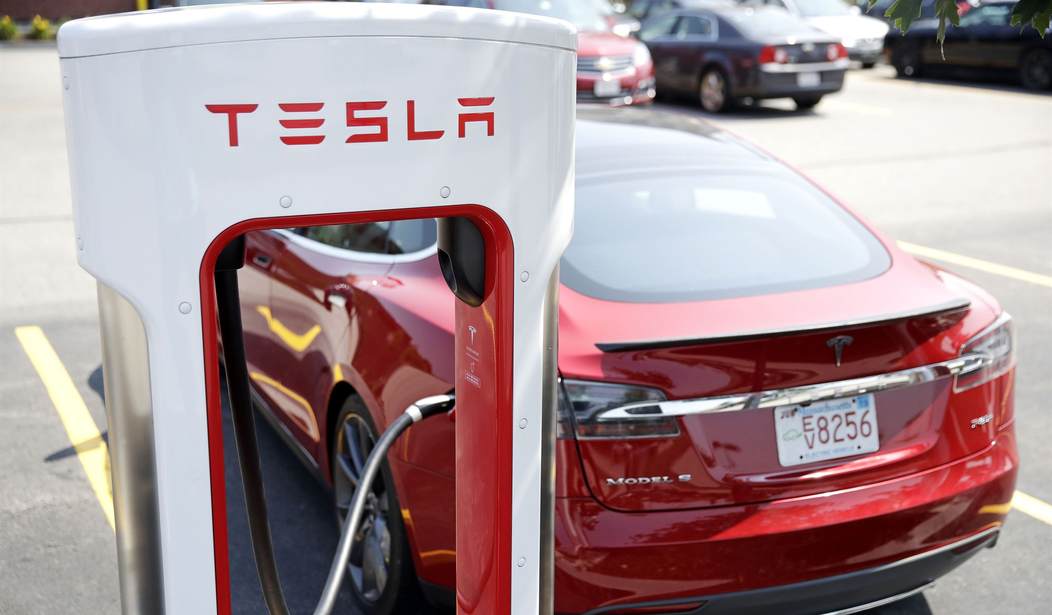After passing a $1.9 trillion COVID relief package, Congress is far from being done spending money this year. Next on the agenda is an infrastructure package that will likely end up carrying a price tag in the neighborhood of $3 trillion. Despite its marketing, this package is not limited to bridges, roads or what one would normally think when they hear “infrastructure.” Just ask Sen. Kirsten Gillibrand (D-N.Y.) who tweeted that many things, including childcare, should be considered as infrastructure. One of the more odious provisions being shepherded through as infrastructure is a $174 billion giveaway to the electric vehicle (EV) industry.
Of the provisions designated for transportation, that $174 billion represents the largest single line item in the entire package. This should hardly come as a surprise to anyone who has paid even the slightest bit of attention to the federal government’s approach to EVs. For years, the government has handed out crony tax breaks and incentives to meddle in the market and prop up an industry that languishes in inefficiency.
Pivotal parts of the actual infrastructure system stand to be neglected because of the government’s obsession with EVs. While EVs get $174 billion in the infrastructure package, railroads and public transportation get a measly $80 billion each. Also, construction on traditional infrastructure needs (highways, roads, bridges, etc.) only receive $110 billion. Imagine what that $174 billion could do if it were funneled towards the country’s actual, immediate infrastructure needs, instead of inefficient technology.
The distraction from funding real transportation issues is not new. Since 2010, the federal government has offered a $7,500 tax credit for buyers of EVs. This tax credit will be phased out when the manufacturer sells 200,000 qualifying vehicles. So far, only two automakers have surpassed that threshold.
Recommended
The tax credit (which has been rumored to increase to $10,000) has failed to accomplish its primary goals of incentivizing the purchase of these vehicles and helping the environment. A study from the Pacific Research Institute showed that roughly four out of every five households that utilized the credit raked in over $100,000 in yearly salary. It has functioned as a re-working of the tax code to provide benefits to those who have no need of them to buy a vehicle. It is a regressive giveaway in the truest sense.
Yet, as Biden simultaneously champions tax hikes on the affluent classes, his infrastructure package would expand the EV tax credit beyond its current limits. If Biden truly wanted to make the tax code less regressive, he should do a complete about face and repeal the EV tax credit in its entirety. However, that is never what it has been about.
Beyond expanding tax incentives for EV buyers and manufacturers, this package would fund the building of half a million EV chargers nationwide. Imagine the outrage if taxpayer money was allocated to build traditional gas stations en masse.
Proponents of EV subsidies also claim that the $174 billion represents an earnest effort to severely reduce emissions and further incentivize electric vehicle purchases. However, if the goal is environmental protection, this is an odd way to go about it. According to the World Economic Forum (WEF), “Raw materials needed for batteries are extracted at a high human and environmental toll. This includes, for example, child labour, health and safety hazards in informal work, poverty and pollution.”
That the government has gone so far out of its way to promote EV ownership is mind-boggling given its stated goals. Yet, year after year they seem intent on hitching their wagons to this cause that has proven to be incredibly counterproductive. After well over a decade, if the EV industry cannot survive absent this government micromanaging and tinkering, then perhaps the country ought to look for other avenues.
Moreover, the government could let the private sector do what it does best: innovate. Instead of regulating ride-share apps, let them continue to grow and expand their services to free-standing bikes and scooters, as Uber has done. The market is providing viable options absent the government – and often in spite of it. Policymakers should be grateful and marvel at their success instead of trying to force the market down a single narrow path towards electric vehicle ownership.
In short, there are myriad options to accomplish the transportation and infrastructure needs of the nation. Continuing to waste hundreds of billions of taxpayer dollars on EVs is among the least efficient of them all. As America begins to see the scale of its spending and debt accumulation over the last year, there will be an immense need to cut waste. Thankfully, there is a $174 billion option primed for the chopping block if only lawmakers would let it go.

























Join the conversation as a VIP Member